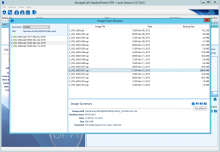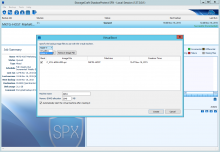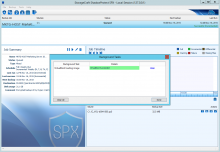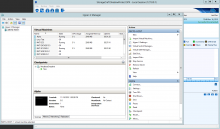
StorageCraft VirtualBoot Technology
Boots a backup image of a system volume into a virtual machine
Overview:
NEW! VirtualBoot now supports Hyper-V
With StorageCraft VirtualBoot technology, you can now boot a protected Windows system as a guest VM directly on a Hyper-V host when using Windows Server 2012 R2. SPX required.
See technical specifications to learn what's needed to support Hyper-V.
What is VirtualBoot, and who should use it?
VirtualBoot boots a backup image of a system volume into a virtual machine (VM).
This technology is included with:
- StorageCraft ShadowProtect backup software
- StorageCraft ShadowProtect SPX backup software
Anyone who uses either ShadowProtect or SPX can take advantage of VirtualBoot.
ShadowProtect, SPX, and VirtualBoot are part of the StorageCraft Recovery Solution. This solution provides you with the tools you need to recover your systems every time, everywhere, from any disaster.
In ShadowProtect
You can use VirtualBoot to:
Boot any ShadowProtect backup image of a system volume into a VM.
In SPX
You can use VirtualBoot to:
- Boot a ShadowProtect or SPX Windows or Linux backup on a supported Linux version
- Boot a ShadowProtect or SPX Windows backup on a supported Windows system
- Boot any ShadowProtect or SPX backup of a Windows system as a guest VM on a Hyper-V host when using Windows Server 2012 R2
When to use VirtualBoot
You can use VirtualBoot anytime that you need to quickly virtualize a system that ShadowProtect or SPX is backing up. Here are some common scenarios for which IT pros use VirtualBoot:
Testing Backups
You can boot a ShadowProtect or SPX backup image into a virtual machine to make sure a restored system would function properly. VirtualBoot loads the operating system, applications, and data into the VM, thus giving you a reliable and speedy way to regularly verify that your backups work as expected.
Temporary System Failover
Restoring a large system can take a lot of time, but virtualization can help. In just a few minutes, you can create a temporary VM of a failed server or workstation with VirtualBoot to tide you over. Because your VirtualBoot VM has everything in it that the original machine did, it still has ShadowProtect or SPX installed and can continue to back up the system, thus protecting any new files or folders.
Software Testing in a Virtual Sandbox
When you want to test a new application (or upgrade an existing application), you can use VirtualBoot to launch a VM of the production system's latest backup file and install the application on the new VM. You can then evaluate the software performance within your actual IT environment but without any risk to your production system.
Historical Data Access
Many data files require specific software to open them. When you need access to old data (such as during an investigation or audit), and you no longer have the application that opens these data files, you can VirtualBoot an archived ShadowProtect or SPX backup image. The resulting VM will contain both the data needed and the application that opens the files.
Technical Specifications:
VirtualBoot in ShadowProtect
VirtualBoot leverages open-source Oracle VirtualBox virtualization software to boot a backup image into a VM.
- ShadowProtect supports most versions of VirtualBox (Contact us for a complete list)
- You should install and configure VirtualBox ahead of time so it’s ready when you want to use VirtualBoot.
VirtualBoot in SPX
VirtualBoot leverages either Oracle VirtualBox or Microsoft Hyper-V hypervisor to boot a backup image into a VM.
- SPX supports most versions of VirtualBox (Contact us for a complete list).
- You should install and configure VirtualBox ahead of time.
- When using VirtualBoot with Hyper-V, the host has to be Windows Server 2012 R2.
- To use with Hyper-V, you need to install the StorageCraft VirtualBoot Hyper-V Plugin—see Software Updates to download the .MSI file.




